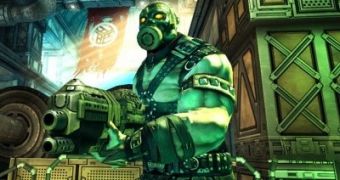The creator of the popular Samurai II: Vengeance mobile game, MadFinger Games has just announced the upcoming SHADOWGUN game especially developed to feature support for next-gen processors and GPUs.
The company plans to expand its mobile games line to more platforms, such as smartphones, iOS devices and tablets.
In this regard, the developer officially stated that SHADOWGUN will support Android mobile devices powered by the NVIDIA Tegra chip, and will be available on the Tegra Zone app as well as Android Market.
SHADOWGUN is built with Unity's development platform and combines tactical combat with third person action.
Story-wise, the gamers will play the role of John Slade, a professional bounty hunter in the year 2350.
The central character of the game has a primary mission, to hunt down Dr. Edgar Simon, a famous geneticist and former employee of the trans-galactic corporation Toltech Enterprises.
While playing as the “shadowgun” John Slade, players will have to infiltrate Dr. Simon's mountain fortress and fight his personal army of mutants, cyborgs, and genetically-enhanced humanoids.
No worries though, as the player has a high amount of weaponry at his disposal ranging from ships and heavy weapons.
In addition, Slade's personal android assistant, S.A.R.A will make sure players know everything they need to know to successfully accomplish their mission.
According to MadFinger Games, the story is written by award winning author Micah Nathan who is also the executive creative consultant for the game.
“SHADOWGUN is possibly the the best expression of quality production achievable on mobile devices and a great indicator of what consumers can expect from future mobile games,” said Brett Seyler, General Manager of Union.
“We're very proud to see this kind of creative product created with Unity and excited to offer it to our partners through our Union distribution service.”
On related news, MadFinger announced that it will also develop an even more enhanced version of the game that will support NVIDIA's Project Kal-El, the next-generation Tegra quad-core processor.

 14 DAY TRIAL //
14 DAY TRIAL //